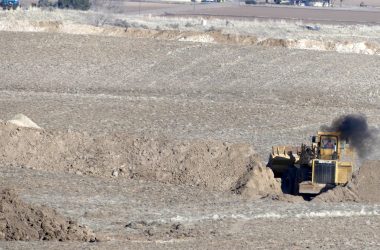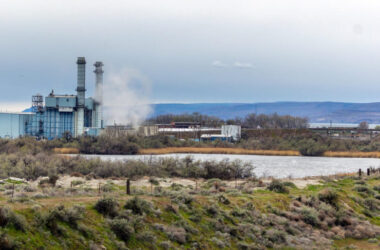
Drinking lots of water was first among the farmworkers’ protective measures to stay safe in the heat. (The Enterprise/Angelina Katsanis)
Editor’s note: Some of those interviewed agreed to talk only if their identities were protected as they may not have legal immigration status.
VALE – Following the heat-related death last month of Sebastian Francisco Perez, an indigenous Guatemalan nursery worker in the Willamette Valley, the state Occupational Safety and Health Administration is requiring employers to better protect workers.
A 2018 study by the Oregon Health Authority estimates that 4,567 migrant and seasonal farmworkers live in Malheur County. Locally, farmworkers told the Enterprise that they and their employers weren’t waiting for government guidance to take safety measures in the extreme weather that has a continuing hold over the area.
The most important adaptation to the heat that workers highlighted was the freedom to stop working if they felt sick.
Roberto, a farmworker from Guerrero, Mexico, who now lives in Nyssa, works for the Caldwell-based contractor García Farm Labor. The nature and location of the work changes depending on where the bosses send the team, but the hours are consistent: from 6 a.m. to 6 p.m.
Still, said Roberto, because of the heat, “at the hour we wish, we can go.”
Nina, a farmworker from Guanajuato, Mexico, who works at Neighborhood Family Farms in Vale, weeds onion fields from 6 a.m. to 2 p.m. But like Roberto, she said that she felt protected from the heat because her supervisors allow her to leave as early as noon if conditions warrant.
“In a case where it’s very hot, we can stop before (2 p.m.),” she said.
Nina said that there was precedent for leaving early because her employers gave permission to take time off during the weekday “for appointments and everything.”
Despite this, because Nina is paid hourly, there is an incentive for her to stay until the end of the day if possible.
“If we see that we can bear it a little longer, we stay for a bit more,” said Nina.
Nina described an arduous workday of weeding onions, sometimes standing with a hoe, other times hunched over and pulling by hand. Sometimes the weeds will have thorns.
To shield themselves from the sun, Nina and her coworkers dress carefully.
“We use sunscreen,” she said. “We wear long sleeves, gloves, and hats. We have our umbrellas for the break times and we are constantly drinking water.”
Guadalupe, who is from Guerrero, Mexico, but has worked in the fields of Idaho and Oregon for 30 years, is one of the “mayordomos” for Roberto’s work crew. That means that she functions as crew boss for a group of about 30. She explained that while sometimes her crew weeds onions, like Nina’s, more recently they having been topping corn. That means walking down rows and cutting off the tassel from each female stalk to improve the plants’ strength and yield.
Guadalupe supervises the crew’s hours, including their three daily breaks. She said she frequently checks in with her workers.
“Since one is in charge, one asks them how they’re doing with the heat,” she said.
Guadalupe explained that the workers hadn’t wanted to share water from a large cooler.
“They bring their own water with ice,” she said.
On a recent visit to a García Farm Labor work site outside of Weiser, cars lined the dirt road at the edge of the field. Workers wearing bandanas, heavy layers, and long-brimmed straw hats stepped in and out of the rows, trailed by the sound of ranchera music blasting from the cellphones in their pockets. At the end of one row was a metal bucket filled with ice, sodas, waters, and Gatorades, and colorful canteens sat in front of most of the cars.
According to workers, the crew doesn’t have to wait for a break to drink water. Guadaulpe said that “no one has passed out” because of the heat. And the contractors – a family – often come to check on the group.
Under the new Oregon OSHA heat rules, however, all this and more will be required of employers, not just in agriculture, but across all industries. The new rules went into effect July 8 and are applicable whenever the heat index – a measure of heat and humidity – reaches 80 degrees.
At that temperature, shade and cool water must be provided to workers, and by August 1, so must training on heat-related safety procedures. At 90 degrees, employers must additionally be reachable to workers by phone, implement an emergency medical plan, and have methods for monitoring workers for heat-related stress.
Not all of the workers interviewed, however, knew about their rights under the temporary rule, which will last until at least January.
That, according to Zaira Sanchez, emergency relief coordinator at the United Farm Workers Foundation, is only one of the challenges with the new rules.
“I think that the new measures are definitely an improvement,” Sanchez said. “They’re the leading standard right now for the country. However, just because there’s rules in place doesn’t mean they’re going to get enforced. That’s one of our biggest concerns.”
Sanchez said farmworkers fear retaliation if they complain about work conditions.
“Farmworkers, because of their (immigration) status, are a more vulnerable community,” she said.
United Farm Workers Foundation has an eastern Oregon operation based in Hermiston, three hours by freeway from Vale. But Sanchez said that farmworkers could get help by texting “esencial” to 877-877. Those seeking to file a formal complaint can get help through the foundation’s hotline, 1-877-881-8281.
On July 14, after Oregon’s immigrant rights community signaled concern over the need for strong enforcement of the heat rules, OSHA announced “a multi-faceted effort, involving both education and enforcement,” to ensure that the measures are followed. The push will go at least through Sept. 30 and include incorporating evaluations of heat rule compliance into workplace inspections and a maximum penalty of $126,749 for willful or repeat violation of the rules.
Free consultation for agricultural employers seeking to maintain a compliant workplace can be found at https://osha.oregon.gov/consult/Pages/index.aspx.
News tip? Contact reporter Liliana Frankel at [email protected] or 267-981-5577.
SAFEGUARD YOUR LOCAL NEWS
Take one action today to help the Enterprise grow and do more for the community through accurate, fair reporting.
SUBSCRIBE: A monthly digital subscription is $5 a month.
GIFT: Give someone you know a subscription.
ONE-TIME PAYMENT: Contribute, knowing your support goes towards more local journalism you can trust.




